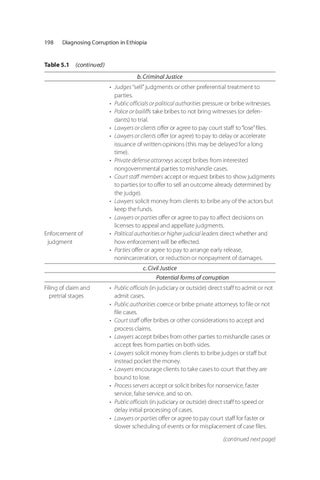198
Diagnosing Corruption in Ethiopia
Table 5.1 (continued) b. Criminal Justice
Enforcement of judgment
• Judges “sell” judgments or other preferential treatment to parties. • Public officials or political authorities pressure or bribe witnesses. • Police or bailiffs take bribes to not bring witnesses (or defendants) to trial. • Lawyers or clients offer or agree to pay court staff to “lose” files. • Lawyers or clients offer (or agree) to pay to delay or accelerate issuance of written opinions (this may be delayed for a long time). • Private defense attorneys accept bribes from interested nongovernmental parties to mishandle cases. • Court staff members accept or request bribes to show judgments to parties (or to offer to sell an outcome already determined by the judge). • Lawyers solicit money from clients to bribe any of the actors but keep the funds. • Lawyers or parties offer or agree to pay to affect decisions on licenses to appeal and appellate judgments. • Political authorities or higher judicial leaders direct whether and how enforcement will be effected. • Parties offer or agree to pay to arrange early release, nonincarceration, or reduction or nonpayment of damages. c. Civil Justice Potential forms of corruption
Filing of claim and pretrial stages
• Public officials (in judiciary or outside) direct staff to admit or not admit cases. • Public authorities coerce or bribe private attorneys to file or not file cases. • Court staff offer bribes or other considerations to accept and process claims. • Lawyers accept bribes from other parties to mishandle cases or accept fees from parties on both sides. • Lawyers solicit money from clients to bribe judges or staff but instead pocket the money. • Lawyers encourage clients to take cases to court that they are bound to lose. • Process servers accept or solicit bribes for nonservice, faster service, false service, and so on. • Public officials (in judiciary or outside) direct staff to speed or delay initial processing of cases. • Lawyers or parties offer or agree to pay court staff for faster or slower scheduling of events or for misplacement of case files. (continued next page)
